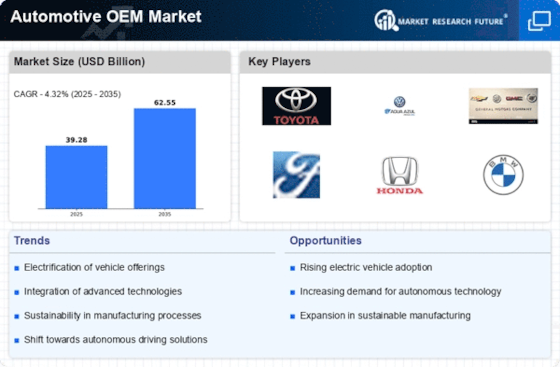Top Industry Leaders in the Automotive OEM Market
*Disclaimer: List of key companies in no particular order
Competitive Dynamics in the Global Automotive OEM Market
The expansive and dynamic realm of the worldwide automotive OEM market unfolds as a vast tapestry, marked by fierce rivalry among established contenders and the emergence of disruptive newcomers. This analysis delves into the intricate competitive dynamics, spotlighting pivotal players, adopted strategies, determinants of market influence, nascent participants, and the comprehensive competitive panorama.
Prominent Contenders:
- Toyota Motor Corporation
- Volkswagen AG
- Nissan
- Honda Motor Co.
- Magna International Inc.
- Continental AG
- CIE automotive
- Siemens
- BMW AG
- Exide Industries Limited
- Denso Corp
- Robert Bosch, GMbH.
- Valeo
- Aptiv
- Ford Motor Company
- Mitsubishi Motors Corp
Enterprising Electric Vehicle (EV) Initiatives: Tesla, Rivian, Lucid Motors, NIO, Xpeng, Li Auto
Up-and-Coming Asian OEMs: Geely Holding Group, Great Wall Motors, SAIC Motor, BYD Company
Strategic Pursuits:Pivoting Towards Electrification: Seasoned OEMs channel substantial investments into the development and production of electric vehicles (EVs), aiming to seize a foothold in the rapidly expanding EV domain. Pioneering the EV space, Tesla, Rivian, and Lucid Motors spearhead advancements, while conventional OEMs such as Volkswagen and Toyota strive to catch up.
Investments in Autonomous Driving: Leading entities invest significantly in autonomous driving technologies, endeavoring to gain a competitive edge in the future of mobility. Companies such as Waymo (Google), Cruise (GM), and Baidu spearhead developments in autonomous driving.
Cultivating Partnerships and Collaborations: OEMs forge strategic alliances and collaborations with technology firms, startups, and other entities to expedite innovation and secure access to novel technologies and expertise.
Venturing into Emerging Markets: Established OEMs extend their reach into burgeoning markets like China, India, and Southeast Asia, spurred by escalating demand for vehicles in these regions.
Streamlining Costs and Enhancing Efficiency: OEMs implement measures to optimize costs and enhance operational efficiency, aiming to fortify profitability and vie competently.
Determinants for Market Share Analysis:Brand Eminence and Customer Allegiance: Esteemed brands like Toyota and Volkswagen command robust reputations and customer allegiance, conferring a competitive edge.
Product Portfolio Diversity and Innovation: OEMs boasting diverse product portfolios and a history of innovation are apt to attract customers and secure market share.
Manufacturing Proficiency and Cost Competitiveness: Streamlined and cost-competitive production processes stand pivotal for triumph in the automotive industry.
Robust Distribution Network and Post-Sales Support: A robust distribution network and exemplary post-sales service prove indispensable for customer contentment and enduring success.
Commitment to Research and Development: Persistent investments in research and development prove critical to outpacing competition and pioneering new technologies.
Novel and Ascendant Firms:Several novel and ascendant enterprises are challenging traditional automotive behemoths. These entities concentrate on specific niches, encompassing electric vehicles, autonomous driving, and ride-hailing. Exemplary instances include:
Tesla: Spearheading the electric vehicle domain, Tesla commands a substantial market share in the premium EV segment.
Rivian: An American EV startup focalizing on electric pickup trucks and SUVs.
Lucid Motors: Another American EV startup concentrating on opulent electric sedans.
NIO: A Chinese EV startup with a focus on upscale SUVs and sedans.
XPeng: A Chinese EV startup emphasizing technology and autonomous driving features.
Li Auto: A Chinese EV startup concentrating on SUVs with extended-range technology.
Holistic Competitive Scenario:The automotive OEM market undergoes noteworthy transformations propelled by technological strides, evolving consumer inclinations, and the ascendancy of new contenders. Conventional OEMs encounter rigorous competition from EV startups and burgeoning Asian OEMs. The market is poised for ongoing consolidation, with smaller entities either amalgamating with or being acquired by larger corporations. The emphasis on electrification and autonomous driving is anticipated to further redefine the competitive landscape.
Supplementary Considerations:Government Regulations and Policies: Policies governing emissions standards, fuel efficiency, and subsidies for EVs wield considerable influence over the competitive landscape.
Economic Variables: Global economic conditions, encompassing currency fluctuations and trade impediments, can exert sway over the automotive industry.
Sustainability and Environmental Considerations: Heightened consumer apprehensions regarding the environmental footprint of vehicles propel demand for more sustainable and fuel-efficient alternatives.
Industry Progressions and Recent Unveilings
Volkswagen AG• Dec 05, 2023: Volkswagen inaugurates its inaugural fully electric SUV, the ID.4. (source: Volkswagen press release)
Honda Motor Co., Ltd.• Oct 20, 2023: Honda discloses a collaborative venture with GM to pioneer self-driving car technology. (source: Honda press release)• Nov 05, 2023: Honda introduces its novel Clarity electric sedan at the Los Angeles Auto Show. (source: Honda press release)
Continental AG• Oct 30, 2023: Continental declares intentions to inject €2 billion into autonomous driving technology by 2025. (source: Continental press release)
Magna International Inc.• Oct 28, 2023: Magna reveals plans to allocate $400 million toward a state-of-the-art electric vehicle manufacturing facility in Ontario, Canada. (source: Magna press release)










